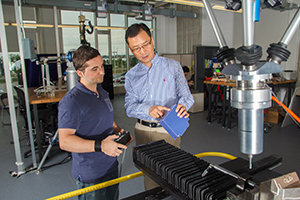Mechanical Engineering (PhD program)
Overview
 Focus areas of research include mechatronics and manufacturing, as well as energy and thermofluids engineering. Automotive systems are also a major focus, as this discipline relates to many applications in mechanical engineering.
Focus areas of research include mechatronics and manufacturing, as well as energy and thermofluids engineering. Automotive systems are also a major focus, as this discipline relates to many applications in mechanical engineering. The main objective of the
Fields
- Automotive Engineering
- Energy and Thermofluids Engineering
- Mechatronics and Manufacturing Engineering
Admissions
Admissions
- Completion of a Master of Applied Science (MASc) level degree in engineering from a Canadian university, or its equivalent from a recognized institution.
- A minimum B+ average (GPA: 3.3 on a 4.3 scale or 77 to 79 per cent).
Required supporting documents
Please see the checklist of required documents for a list of supporting documentation that must be submitted with your application.
Required test scores for English language proficiency
See English language proficiency for the minimum required test scores for this program.
Please see application deadlines for specific dates. Note that the application deadlines listed are for both the online application and all supporting documentation.
Applications for admission to all graduate studies programs are submitted online. There are five steps you must go through to complete the application process. See application process and requirements for step-by-step instructions.
Many of our graduate programs are extremely competitive; the number of qualified applicants normally exceeds the number of seats available for each intake. Satisfaction of minimum entry requirements does not ensure admission.
Research areas
- Active noise and vibration control
- Advanced composites
- Advanced refrigeration and air conditioning
- Aeroacoustics
- Automotive systems (see Automotive Engineering program)
- Biomass combustion and gasification
- Combined cycle power generation
- Controls
- Dynamics, vibration and noise
- Energy conversion and management
- Engineering design
- Fluid-structure interactions
- Heat transfer, fluid mechanics and multiphase flows
- Hydrogen production, storage, transportation, delivery and use
- Hydrogen, ammonia and fuel cell technologies
- Integrated energy systems
- Manufacturing and materials
- Mechanics of solids and structures
- Mechatronics
- Modelling and simulation of energy systems
- Multi-generation energy systems
- Nanomaterials and structures
- Renewable energy systems (e.g., wind, solar, geothermal)
- Robotics, automation and controls
- Smart energy systems
- Thermal energy storage
Learn more about the research areas within this program and find research experts by visiting the faculty’s website and the university’s Expert Centre.
Additional Information
- ENGR 5510G – Foundations of Software Engineering
- ENGR 5520G – Software Development Methods and Tools
- ENGR 5590G – Software Engineering Studio
- ENGR 5550G - Software Testing and Quality Assurance
- ENGR 5560G - Software Security and Dependability
- ENGR 5740G - User Interface Design
- ENGR 5785G - Real-Time Data Analytics for Internet of Things
Please note that courses are subject to change without notice.
- Loading...
- Loading...
- Loading...
- Loading...
- Loading...
- Loading...
- Loading...
- Loading...
- Loading...
- Loading...
- Loading...
- Loading...
- Loading...
- Loading...
- Loading...
- Loading...
- Loading...
- Loading...
- Loading...
- Loading...
- Loading...
- Loading...
- Loading...
- Loading...
- Loading...
- Loading...
- Loading...
- Loading...
- Loading...
- Loading...
- Loading...
- Loading...
- Loading...
Internal awards and funding
Applicants to research-based graduate programs who are studying full-time are automatically considered for some types of funding at the time of admission.
Types of funding that do not require an application:
- Entrance scholarships
- Minimum funding packages
- Teaching assistantships, research assistantships and graduate research assistantships
For more details on the above funding opportunities, see graduate student awards and funding.
Please note: Part-time students are not eligible for the above funding opportunities.
External awards and funding
Graduate program applicants are encouraged to apply for external awards to help finance their education. The application process differs for each competition, so review the information carefully to determine where and when you must apply. Please note: The majority of these awards are for domestic or permanent residents only.
Tuition fees for graduate programs are charged on a flat-fee or fee-per-credit basis and vary by program and student status.
For current, specific fees and details on flat-fee versus fee-per-credit programs, please see tuition and fees.
Contact the program:
Faculty of Engineering and Applied Science
905.721.8668 ext. 5477
grad.engineering@ontariotechu.ca
Contact the School of Graduate and Postdoctoral Studies:
905-721-3190
connect@ontariotechu.ca